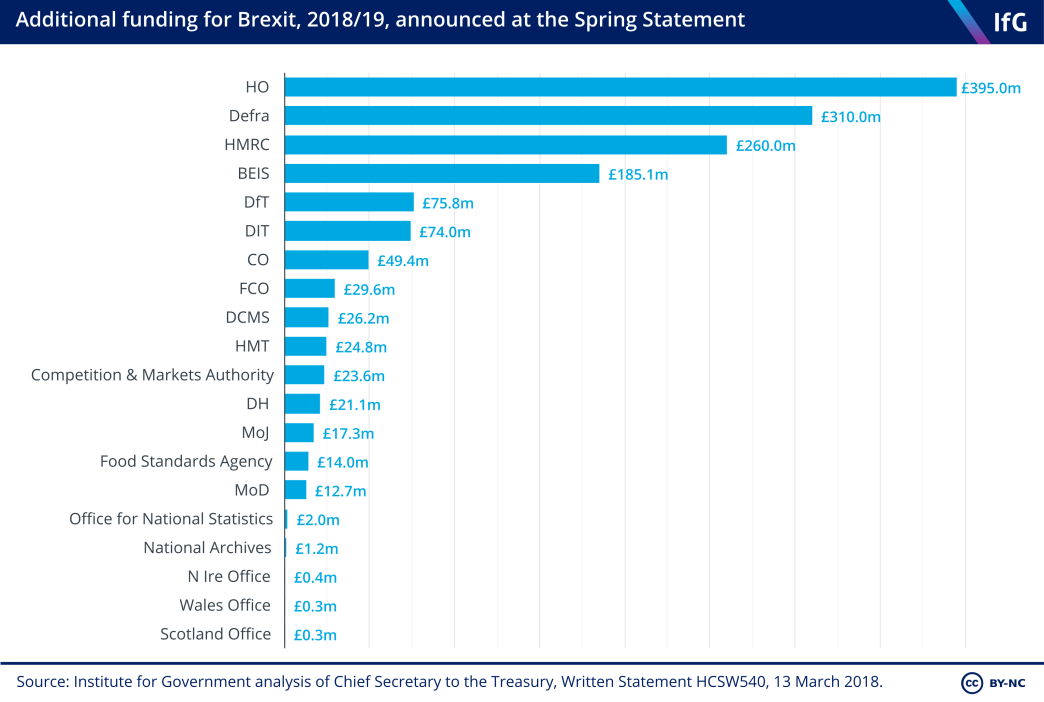Whitehall steps up a Brexit gear
Whitehall departments' Brexit spending allocations show a move in policy from development to implementation.
The Spring Statement shows what Whitehall departments want to spend on Brexit in the coming year. Lewis Lloyd argues that the numbers show a move in policy from development to implementation.
Just a day after of our report Costing Brexit showed that Whitehall will spend around £2 billion (bn) on its Brexit preparations by the time the UK actually leaves the EU in March 2019, the Treasury accompanied the Spring Statement with a breakdown of how Brexit money will be allocated in 2018/19.
The Spring Statement chimes with our headline figures
The allocations for 2018/19 total just over £1.5bn. Added to our £400 million (m) estimate of the money spent by departments in 2017/18 and the £100m already budgeted for the Department for Exiting the EU (DExEU) for the coming year, Whitehall spending on preparing for Brexit comes to around £2bn by the departure date.
As with all allocations, this may change. Departments may rethink their requirements, perhaps influenced by progress (or a lack thereof) in Brussels. Moreover, the figures do not include other bits of funding announced previously or cash being reallocated within departments.
Frontline Brexit departments are getting five times more cash this year than last
If Whitehall spent last year in thinking mode, the next financial year is about full-scale delivery. The vast majority of the additional funding is for departments on the front lines of implementing Brexit.

- The Home Office is the primary beneficiary. Its £395m allocation is roughly equivalent to the £400m we estimated was spent on Brexit across all government departments in 2017/18. This money will be used to support a growing Border Force, and the development of new immigration systems.
- The Department for Environment, Food and Rural Affairs (Defra) has been allocated £310m, almost double what it estimated it would need back in summer 2017. This will include the cost of creating a new system for controlling imports of live animals and animal products, changes to agricultural support and fisheries management, and possibly a new chemicals regulator.
- Her Majesty’s Revenue and Customs (HMRC) is set to receive £260m to support its preparations for an estimated five-fold uplift in customs declarations after Brexit.
- The Department for Business, Energy and Industrial Strategy (BEIS) – responsible for establishing a new nuclear-safeguards regime – has a budget increase of £185m.
- The Department for Transport (DfT) is receiving over £75m – around 15 times what it received last year. This enormous increase reflects what the transport sector will need to do in preparing for Brexit, with an increased workload for bodies such as the Driver and Vehicle Standards Agency (DVSA), Driver and Vehicle Licensing Agency (DVLA) and Civil Aviation Authority (CAA).
- The Cabinet Office has been allocated almost £50m, including money to support digital and commercial functions and programme delivery across the civil service.
- Implementation aside, the Department for International Trade (DIT) is looking at another £74m for the next phase of trade negotiations with the EU, and to develop trade relationships further afield.
We can see regulators getting Brexit money for the first time
Substantial sums are going towards regulators, as Brussels' red tape becomes Whitehall’s red, white and blue tape.
Most regulators receive funding from departments (the Animal and Plant Health Agency, for instance, will receive cash from Defra) or levy the businesses they regulate.
But two important non-ministerial departments have their own lines in spending plans: since both need to increase capacity after Brexit, the Competition and Markets Authority and the Food Standards Agency will receive almost £40m between them.
Spare a thought for the Northern Ireland Office
With the question of the Irish border bedevilling negotiators on both sides of the Channel and with no Executive in Belfast, there is surely no shortage of work for the Northern Ireland Office. But the department has been allocated just £400,000 – a similar amount to what DExEU spent on interpreters at the Council of the European Union in 2017/18.
- Supporting document
- cost-of-brexit-what-whitehall-spending-insight-final-vb.pdf (PDF, 439.86 KB)
- Topic
- Brexit Public finances
- Keywords
- Public spending Budget
- Administration
- May government
- Publisher
- Institute for Government